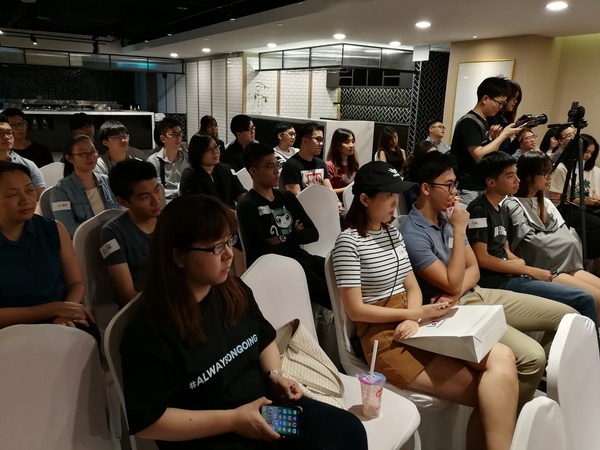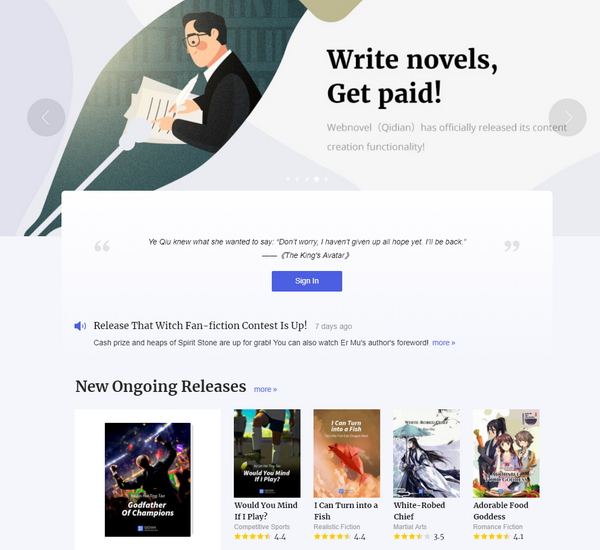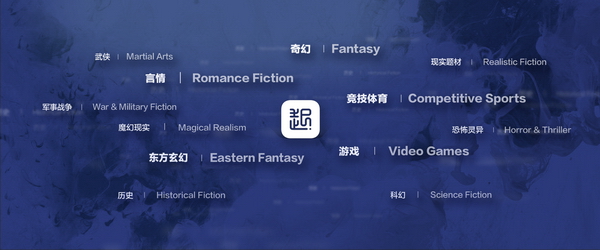Net Translator CKtalon: The overseas translation of China’s online literature
[Editor’s note]As a cross-cultural global communication activity, writing and translation jointly determine the quality of overseas communication. On June 8th, the "Online Literature Overseas Communication Summit Forum" hosted by Yuewen Group and its overseas portal Webnovel was held in Singapore. Lin Tingfeng, editor-in-chief of Yuewen Group, and many writers, translators and editors of Yuewen attended the event to discuss the development direction of online literature overseas communication. It is worth mentioning that the online reading group has already jumped out of the local Chinese circle. Malaysian translator Insignia said at the meeting, "To my surprise, non-Chinese Malaysian residents are also reading novels in Webnovel, and this group is rapidly expanding, breaking the racial barriers, gender differences and geographical distances, so that everyone can share a novel and share a world. "This article is a speech made by CKtalon, a Singaporean translator, at the meeting. CKtalon is translating Zhenwu World, Flying Sword Asked and other works.

First, the status quo of overseas translation
Good afternoon, everyone. I’m Hongwen from Singapore, and I’m also CKtalon, the translator of Starting Point International. Today, I am here to share with you the overseas translation of China’s online literature.
First of all, what I want to share with you is the status quo of overseas translation. Since November 2015, I have been involved in the Chinese-English translation of the oriental fantasy "Zhenwu World", and later I have gradually tried different types such as city, Er Yuan and Xian Xia. Although I was not the first person to "eat crabs", I was fortunate enough to witness the process of China’s online writing going to sea. Different from domestic readers, China’s online text that overseas readers first came into contact with belongs to a second creation, that is, the version translated and edited by the translator according to the Chinese version of the novel. Mr. Yu Guangzhong, a famous contemporary translator, once said: Translation is a conditional creation. I quite agree with Mr. Yu’s point of view. In the process of transforming from one language to another, the translator needs to constantly overcome the personal uniqueness in his creation and approach the original infinitely. Translators need to understand what the original author is thinking and expressing through the original text. More importantly, what he is passing on to the readers.
In my opinion, the classification of translators is actually very similar to the system of cultivating immortals in China’s net. Nowadays, most web translators are still in the stage of building a foundation, that is, translating to readers word by word according to the original text. This kind of translation without merit can only make readers understand who is doing what.
Then the translator will tell the story better and more vividly. They will make readers understand the plot and increase the overall readability and fluency. Especially in the depiction of the characters’ mood, readers will feel the emotions of the characters at this moment through various methods such as capitalization, boldness, italics, punctuation and so on.
Yuan Ying-level translators will make up for the logical loopholes of the original author and narrate the original author’s incomplete meaning completely. However, due to the difficulty in grasping the scale, there are still few such high-level translators at present.
Of course, there are also a lot of practicing translators who have a large number of omissions, mistakes and even machine turns.
Therefore, at present, the translation level of the whole overseas online text is still uneven. At first, due to the lack of choices, readers were more tolerant of such works with poor translation level. However, with the increasing number of online novels in China, readers are constantly evolving. I believe that these practicing translators will eventually be eliminated by the market.

Second, the difficulties in China’s online translation
Secondly, it is the translation difficulty of China’s net text. As a translator with more than two years’ online translation experience, I have a deep understanding of the difficulties encountered in the translation process.
Translation is to let cultures communicate and understand each other. Therefore, the first difficulty lies in the interpretation of the words with China characteristics. It is not a simple matter to explain the meaning clearly and make the reader understand it. I still remember that when I first started translating Zhenwu World, the translation time of each chapter was nearly two hours. As an oriental fantasy novel, those levels of cultivation, idioms and common sayings are inevitable. I understand the meanings of those words that contain China culture, such as "Then", "Yuan Shen" and "Immortal", but I really don’t know how to translate them.
For this kind of vocabulary, I usually divide it into two parts: translation and explanation. First of all, translation is to find the most accurate English word. After all, translation is not a brand-new field, and I think it is undoubtedly a "shortcut" to absorb the wisdom of translators’ predecessors. Therefore, I will choose the most accurate and accepted word by looking for a lot of information and reading a lot of literature. It is undoubtedly not enough to find this word alone, so it needs to be explained to make readers better understand the story and cultural meaning behind this word. I think Starting Point International has done a good job on this point, and we can easily annotate a certain word or sentence in the translator’s backstage. When the front end is displayed, a small gray logo will appear on the right side of the word, and readers can click to see the complete explanation. This will not affect the reader’s reading experience, but also achieve the effect of explanation. Personally, I think this little function is great! In addition to pure text explanation, many translators will also use the combination of pictures and texts to make readers feel more interesting. For example: Tai Ji Chuan, there will be a video of grandpa playing Tai Chi; Sugar-coated haws will put a picture of sugar-coated haws. Of course, readers usually love and hate food photos.
The second difficulty in translation lies in the disunity of nouns. Many China online articles, especially male frequency books, usually have more than 1000 chapters in a book, so many authors will have the problem of writing before forgetting. Some names and places don’t match the previous ones. In the process of translation, the translator will have similar problems. The last time the place name was translated, the next time a new translation method was adopted. In order to avoid these confusions, our translators usually build a vocabulary while translating. The next time you translate this place name, you can find the previous translation method by searching.
For the whole site, I also helped the starting point international to establish a platform-wide vocabulary, which includes many translation methods of surgical words and proper nouns, thus effectively avoiding the problem of inconsistent translation of those surgical words between books and enhancing the reading experience of platform readers. At present, I have sorted out more than 700 translation methods of specialized words.

Third, the future research direction
Finally, I want to share with you our future research direction. Many difficulties in translation actually come down to cultural differences between different countries. In order to further eliminate these reading barriers caused by culture, the future research direction of Starting Point International will also shift to the localization of translation. We will aim at readers from different regions and countries, and through some reasonable adaptations and plot optimization, overseas readers can better understand China’s online texts.